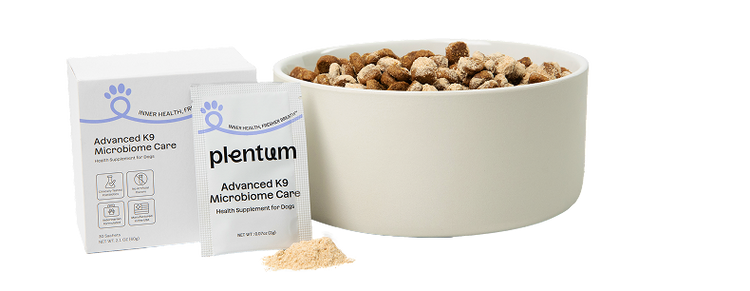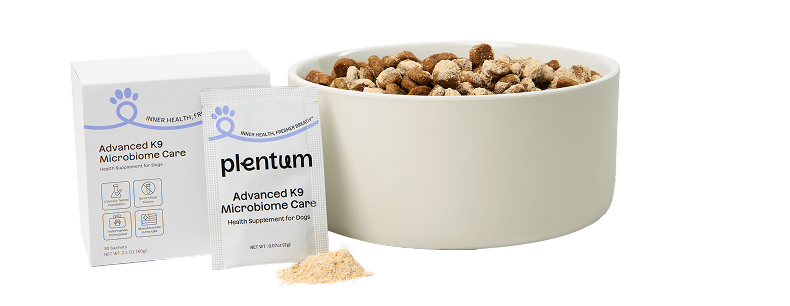As a caring dog owner, you know your companion better than anyone. You notice the subtle shifts in their energy and the small changes in their habits. But what if those small changes, like persistent scratching or a bit of bad breath, are actually signals of a deeper issue? Increasingly, science shows a direct link between these problems and your dog's gut. Recognizing the signs of poor gut health in dogs is the first step toward helping them feel their best, and the clues are often in places you wouldn't expect.
The canine gut is more than just a digestive tube; it's a complex ecosystem called the microbiome, which acts as the command center for their overall wellness. When this system is in balance, it supports everything from nutrient absorption to immunity and even mood. When it's out of balance, a condition called dysbiosis, it can trigger a cascade of issues.
What Are the Obvious Symptoms of Bad Gut Health in Dogs?
These are the "telltale tummy troubles" that most owners quickly associate with a digestive issue. While an occasional upset is normal, persistent symptoms are clear signs of gut imbalance in dogs.
-
Diarrhea: Loose, watery, or frequent stools are a primary sign that the gut is inflamed or struggling to absorb water and nutrients.
-
Vomiting: Frequent or chronic vomiting, especially if it contains yellow bile, indicates significant gastrointestinal irritation.
-
Excessive Gas (Flatulence): A noticeable increase in frequency or a particularly foul odor can be a symptom of poor digestion or food intolerance.
-
Constipation: Straining to defecate or infrequent bowel movements often points to a lack of appropriate dietary fiber or dehydration.
-
Bloating: A visibly swollen or bloated abdomen is a serious concern that can signal painful gas buildup or a more severe condition.
What Are the Hidden Signs of Gut Imbalance in Dogs?
This is where it gets tricky. Many chronic issues that seem unrelated to digestion are actually external symptoms of an internal gut problem.
-
Skin and Coat Issues: The skin is often a direct reflection of internal gut health. A "leaky" or imbalanced gut can trigger a systemic immune overreaction, which manifests as excessive itching, scratching, a dull coat, or dry, flaky skin.
-
Recurring Infections: Does your dog suffer from chronic ear infections or persistent paw licking and yeast? A compromised gut leads to a compromised immune system (about 70% of which is in the gut), making your dog less able to fight off these common invaders.
-
Bad Odors: Persistent bad breath (halitosis) that isn't resolved by dental care, or a foul body odor, can be caused by an overgrowth of "bad" bacteria in the gut.
-
Behavioral Changes: The gut-brain axis is a powerful communication channel. An inflamed gut can disrupt mood-regulating neurotransmitters, leading to lethargy, low energy, irritability, or new or worsening anxiety.
What is the Best Dog Food for Gut Health?
There is no single "best" food, as every dog is unique. The goal is to find dog food for healthy gut function that is built on high-quality, easily digestible ingredients.
Look for a digestion food for dogs that has a simplified, limited ingredient list. This makes it easier to avoid common triggers. The focus should be on a single, high-quality animal protein (like turkey or salmon) and whole-food carbohydrates like pumpkin or sweet potato, which provide fiber.
Many owners find success with fresh or gently-cooked diets because their high digestibility and moisture content are gentle on a sensitive system. A high-quality, well-formulated kibble can also work, especially if it avoids common fillers like corn and wheat and includes beneficial fibers.
How Do Microbiome-Targeted Supplements for Dogs Help?
Beyond diet, targeted supplements can be the key to re-establishing a healthy gut. It helps to understand the "gut health trio":
-
Prebiotics: These are the fuel. They are specific fibers (like inulin from chicory root) that nourish and feed the good bacteria already living in your dog's gut.
-
Probiotics: These are the live factories. They are beneficial bacteria that temporarily boost the population of "good guys," but they must be able to survive the stomach's acid to be effective. Research on strains like Bifidobacterium longum BL999 has even shown a link to reduced anxiety in dogs.
-
Postbiotics: These are the finished products. Postbiotics for dogs are the beneficial compounds produced by probiotics when they ferment prebiotics. These non-living compounds (like short-chain fatty acids) directly support gut barrier function, calm inflammation, and modulate the immune system. Because they aren't alive, they are very stable and deliver consistent, reliable benefits.
A Healthier Gut for a Happier Dog
Identifying the signs of poor gut health in dogs, from the obvious (diarrhea) to the hidden (itching), is the first step to truly turning things around. By focusing on a high-quality, digestible food, good for dog gut health and providing powerful microbiome-targeted supplements, you can help rebalance their internal ecosystem. A balanced gut means a stronger immune system, healthier skin, and a happier, more comfortable best friend.
References
-
Pilla, R., & Suchodolski, J. S. (2020). The Role of the Canine Gut Microbiome and Metabolome in Health and Gastrointestinal Disease. Frontiers in veterinary science, 6, 498. https://www.ncbi.nlm.nih.gov/pmc/articles/PMC6971114/
-
Craig, J. M. (2016). Atopic dermatitis and the canine gastrointestinal microbiome. BMC veterinary research, 12, 43. https://www.ncbi.nlm.nih.gov/pmc/articles/PMC4791855/
-
Purina Institute (n.d.). Interplay Between Nutrition and Canine Anxiety. Retrieved from https://www.google.com/search?q=https://www.purinainstitute.com/science-of-nutrition/brain-health/interplay-between-nutrition-and-canine-anxiety
-
Cargill (n.d.). EpiCor® Pets Postbiotic Pet Food Ingredient. Retrieved from https://www.cargill.com/supplements/epicor-pets-postbiotic-ingredient









